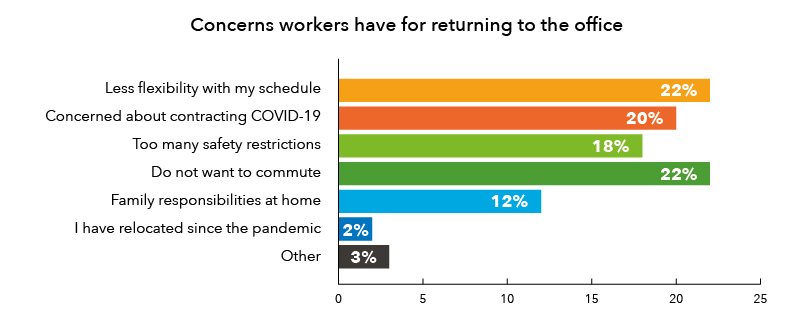Executive Summary
Last March, much of the nation's workforce was forced to their homes to work for what was thought to be a two-week stint. However, as the weeks turned into months with no end to work-from-home life in sight, there has been light at the end of the tunnel with the announcement of the efficacy of vaccines.
CHG Healthcare surveyed more than 850 workers across the country to examine their feelings on the past year of remote/virtual working, as well as returning to the workplace.
Working from Home
According to the survey, 76% of respondents are currently working from home due to the pandemic, with nearly 88% of those fully working from home and the other 12% splitting time between home and the office.
Mental health in the workplace has become a major concern over the past few years, and during the pandemic it has only increased. According to the survey, just over a third (35%) say working from home has positively impacted their mental health, just over a quarter (26%) indicated a negative impact, and 39% reported no change to their mental health.
Of those who indicated that working remotely has impacted their mental health negatively, an overwhelming majority (82%) believe returning to the office will improve their mental health. Sixty-four percent of these individuals say their employers supported their mental health issues. More flexible schedules (30%) and understanding leaders and managers (30%) were where they felt the most support.
Returning to Work
The current pandemic forced businesses to change how they interact and operate. And while many are still months away (or longer) from reopening physical offices, employees anticipate changes when they return, including more opportunities for remote/virtual work (26%), more flexible work schedules (22%), and increased safety measures (17%) including masks, office/cubicle dividers, social distancing, etc. More than three quarters of employees (79%) want their employer to enforce extended time away from the office when an employee falls ill.
With the announcement of a vaccine, a fourth of respondents indicated that their employers have started talking about returning to the workplace, and 27% have already brought people back into the office. Of those who indicated they have employees back in the office, just over half (53%) are back full time.
When the option is available to return to the office, more than half (54%) of respondents indicated that they are more interested in having a hybrid in-office/work-from-home schedule, while 32% have no interest in returning to a physical office, preferring to work from home or virtually. Only 9% want to go back to the office full time.
While 20% of respondents are concerned about contracting COVID-19 when they return to the office, employees are more concerned about losing the flexibility in their schedules (22%) and having a commute (22%). Also, 18% of employees are concerned with the number of safety measures/restrictions that will be implemented (wearing a mask, social distancing, etc.) when they return to work.

A hybrid work schedule was a major theme that emerged from the study. When offices are reopened, just over a third of respondents (35%) said they would be interested in coming back, if it was only a few days each week.
Twenty percent of respondents stated they would be interested in returning to the office knowing that returning employees have been vaccinated, while nearly 19% are only interested in returning to the office when the office is back to its pre-COVID state.
Vaccines and the workplace
With the announcement of the vaccine being administered, we asked employees their feelings about returning to work in the office. Just over a quarter (27%) of respondents stated they would feel comfortable returning to the office, while 20% stated they were never concerned about returning to the office, and a third still prefer working from home.
However, respondents are keen on their co-workers being vaccinated before returning to their office. Of those surveyed, 44% say they prefer their employers require employees to be vaccinated before returning to the office, while 33% don’t think the vaccination should be required before returning, and 23% don’t have an opinion.
Employees also want transparency in regards to the vaccination. According to the data, nearly half (49%) think their employers should disclose the percentage of employees who have been vaccinated. However, 34% say employers don’t need to disclose the percentage and 17% don’t have an opinion.
The survey also revealed that employees hope that employers will do their part to facilitate the vaccination process by hosting on-site COVID-19 vaccinations, with 63% in favor and 34% against. The remaining 3% indicated that they don’t believe people should receive the vaccination.
When asked if employees would be more inclined to get the vaccine if their employer paid for their time off to do so, the results were nearly identical to data about on-site vaccinations, with 63% being more inclined to and 33% not inclined to.
Methodology:
CHG Healthcare (CHG) surveyed more than 850 U.S. workers across the country ranging from ages 18-71. CHG designed the survey instrument to workers’ attitudes and sentiments toward workplace culture, working from home, mental health, and diversity, equity, and inclusion. CHG administered the survey over a seven-day period in February 2021.